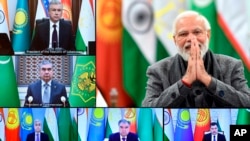Indian Prime Minister Narendra Modi highlighted cooperation at a virtual summit with leaders of Central Asian countries Thursday, calling it vital for regional security and prosperity.
The first-ever summit of India and Kazakhstan, Kyrgyzstan, Tajikistan, Turkmenistan and Uzbekistan took place amid concerns about radical Islamist groups gaining a deeper foothold in the region in the aftermath of the Taliban takeover of Afghanistan.
“I would like to emphasize that Central Asia is central to India’s vision of an integrated and stable, extended neighborhood,” Modi said. “We are all concerned about the developments in Afghanistan. In this context also, our mutual cooperation has become even more important for regional security.”
A joint statement issued after the summit called for regional consensus on issues related to Afghanistan such as the formation of a truly representative and inclusive government in Kabul. It said that the leaders would continue close consultations on the situation in the conflict-ridden nation.
New Delhi, which has been sidelined in Afghanistan since the Taliban takeover, worries that Afghan territory could be used by Islamic militant groups, including those that led a separatist insurgency in Kashmir.
Analysts say such concerns also echo in Muslim-majority Central Asian countries, which are seen as moderate Islamic states. Three of them, Tajikistan, Turkmenistan, and Uzbekistan, share a border with Afghanistan and fear the impact of radical Islam, terrorism and the drug trade in their own territories, according to analysts.
“India wants to use all levers to have a play in the Afghan situation and regional security situation,” says Pankaj K. Jha, a professor of defense and security affairs at O.P. Jindal Global University. “Afghanistan could emerge as a haven for terror groups of different ideological backgrounds and different political objectives and Central Asian countries have concerns about instability due to radicalization.”
Stepping up engagement
The summit was held virtually after the leaders of the Central Asian nations were unable to attend India’s Republic Day celebrations on Wednesday because of a COVID-19 surge.
New Delhi has stepped up its engagement with the region in recent months -- Central Asian countries participated in a regional security dialogue hosted by New Delhi on Afghanistan in November and their foreign ministers met last month.
India’s foreign ministry said that the summit reflected strong momentum in their ties and had set an agenda for increasing cooperation in areas such as medicine, healthcare, education and information technology to boost trade, which the joint statement described as far from “realizing its true potential.”
At the moment, India’s trade with Central Asia is a meager $2 billion. A lack of connectivity to the landlocked countries has been a major hurdle to expanding trade because Pakistan does not allow New Delhi access through its territory. But India hopes to use Iran's Chabahar Port to promote a trade route. Iran shares a long border with both Turkmenistan and Afghanistan.
India’s summit took place two days after Chinese President Xi Jinping also held a meeting with Central Asian leaders to mark 30 years of diplomatic relations. China’s trade with the five countries has flourished, amounting to about $40 billion. The Central Asian countries are also a key part of Beijing’s Belt and Road Initiative.
Analysts say the summits held by the Indian and Chinese leaders underscore the growing geopolitical importance of the region, where Russia has always been influential.




